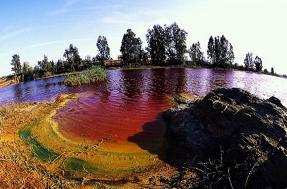- Polluted land
-
- National Inventory of Greenhouse Gases (GHGs)
- National Inventory of Atmospheric Pollutants
- Emissions projections
- Emissions estimation methodologies
- Other relevant information
- Inventario nacional interactivo de emisiones y absorciones a la atmósfera de gases de efecto invernadero
- Inventario nacional interactivo de emisiones de contaminantes atmosféricos
- Interactive report: Projections of emissions and removals into the atmosphere:
-
- Metano en el sector energético
Metales pesados

Existen varias maneras de definir el término “metal pesado”, una de ellas es referida al peso atómico y definiría un metal pesado como un elemento químico comprendido entre 63.55 (Cu) y 200.59 (Hg); otra manera se refiere a los metales de densidad entre 4 g/cm³ hasta 7 g/cm³ y también hay otra clasificación referida al número atómico.
No todos los metales de densidad alta son especialmente tóxicos en concentraciones normales (algunos de ellos son necesarios para el ser humano). No obstante hay una serie de metales pesados más conocidos por su tendencia a representar serios problemas medioambientales el mercurio (Hg), el plomo (Pb), el cadmio (Cd) y el talio (Tl), así como el cobre (Cu), zinc (Zn) y cromo (Cr). En ocasiones se incluye al hablar de contaminación por metales pesados a otros elementos tóxicos ligeros como el berilio (Be) o el aluminio (Al), o algún semimetal como el arsénico (As).
La peligrosidad de los metales pesados reside en que no pueden ser degradados (ni química, ni biológicamente) y, además, tienden a bioacumularse y a biomagnificarse (que significa que se acumulan en los organismos vivos alcanzando concentraciones mayores que la que alcanzan en los alimentos o medioambiente, y que estas concentraciones aumentan a medida que ascendemos en la cadena trófica), provocando efectos tóxicos de muy diverso carácter. En el ser humano se han detectado infinidad de efectos físicos (dolores crónicos, problemas sanguíneos, etc) y efectos psíquicos (ansiedad, pasividad, etc).
En cuanto a normativa cabe destacar el Protocolo de Aarhus (Dinamarca) sobre contaminación atmosférica transfronteriza a gran distancia en materia de metales pesados, que deriva del Convenio de Ginebra sobre contaminación transfronteriza a larga distancia de la Comisión Económica de las Naciones Unidas para Europa (UNECE).
Fuentes emisoras de metales pesados:
This page provides information on cookies we use: We use our own and third-party cookies to keep your session active, personalise your experience, and collect anonymous statistics about how you use this website. You can choose to accept all cookies or select which types you'd like to allow. To learn more about the cookies we use, read our Cookies Policy.
We use two types of cookies on this site. First, there are Functional Cookies, which are essential for the website to work properly. They store session data to make your experience smoother and more convenient. On the other hand, Analytical Cookies collect information about how you use the portal, without personal data, helping us provide a better and more tailored service.
Introduction to the Use of Cookies on the MITECO.gob.es Website
Cookies are small files that are stored on your device when you visit a webpage. They are essential tools that help provide many of the services available on the information society. Among other things, cookies allow a webpage to store and retrieve information about a user's browsing habits or their device. Based on this information, they can be used to recognise the user and enhance the service provided.
Types of Cookies
Depending on the entity that manages the domain from which the cookies are sent and processes the data, there are two types of cookies: first-party cookies and third-party cookies.
There is also a second classification based on how long the cookies remain stored in the user's browser: session cookies and persistent cookies.
Finally, cookies can also be classified into five types based on the purpose for which the data is processed: technical cookies, personalisation cookies, analytics cookies, advertising cookies, and behavioural advertising cookies.
For more information on this, you can refer to the Guide on the use of cookies from the Spanish Data Protection Agency.
Cookies used on the website
The web portal of the Ministry for Ecological Transition and the Demographic Challenge uses Adobe Analytics, an analytics tool that helps website and application owners understand how visitors interact with their content. Adobe Analytics uses a small number of cookies to collect data and generate usage statistics for websites. This information is sent anonymously and is not shared with third parties under any circumstances. You can choose to accept or reject these cookies, as they do not affect the portal’s functionality. However, they help provide valuable information that allows us to offer a better and more tailored service. For more information about Adobe Analytics cookies and privacy, please refer to the following links:
Additionally, pages featuring content from social network X will only set cookies if the user is logged into the X site. For more details on these cookies, please refer to the following link: Privacy on Social Network X
Finally, a technical cookie named MITECO-compliance is stored, which is a first-party, technical, and session-based cookie. It manages user consent for the use of cookies on the website, remembering which users have accepted them and which have not, ensuring that those who have accepted are not shown cookie consent messages at the top of the page. This cookie is essential for the proper functioning of the portal.
Cookies Policy Acceptance / Rejection
The Ministry for Ecological Transition and the Demographic Challenge gives you the option to accept or reject cookies that are not essential for the portal's operation. Upon accessing the portal, a message will be displayed in the centre of the page with information about the cookie policy and the following options:
· Firefox
· Chrome
· Safari